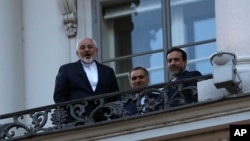As hard deadlines for an Iran nuclear deal softened and extended talks among the six countries negotiating with Tehran stretched into a second week, new issues have surfaced that threaten to derail the process.
The outline of the discussions in Vienna — removing economic sanctions against Iran in exchange for limiting the country's nuclear activity — remains steady, but the concessions to reach that point may be shifting.
Marie Harf, senior advisor at State Department, told CNN on Wednesday that negotiations have been held up on more than one issue.
“There's not just one sticking point… We have to be assured that the nuclear steps the Iranians are taking gets to a year breakout time, cuts off their four pathways to a nuclear weapon. And the Iranians need to have the kind of assurances they need on the sanctions side,” she said.
However, Timothy Stafford, a Research Analyst at the Royal United Services Institute in London, noted that Iran is under a number of sanctions "because of its nuclear activity, but also, sanctions on its missile technology, sanctions in regard to response to terrorism, and [sanctions] for its human rights record."
"Now," he added, "the implicit agreement of the discussions up until this point have been that only those sanctions with respect to the nuclear file [program] would be phased out if an agreement was reached. Iran now wants those sanctions jeopardized and removed as well."
U.N. Arms Embargo
On Thursday, Russian Foreign Minister Sergei Lavrov said Moscow backs Iran's push to get a U.N. arms embargo lifted, but other Western members of the P5+1 negotiating group oppose the move.
Lavrov said that lifting weapons sanctions would help Tehran fight against terrorism - including the Islamic State group.
But in Stafford's analysis, only Russia and China in the P5+1 countries could be interested in ending the arms embargo to sell Tehran weapons.
"In part, this is a move by Iran to split the P5+1 negotiating parties and gain more leverage in the talks," he added.
Mark Fitzpatrick of the International Institute for Strategic Studies in London (IISS) said the obstacles are not new, but are simply coming under the spotlight.
"All along, [Iran] demanded that all U.N. sanctions be lifted," he said. "And all along, the United States and its partners have been saying ‘No. The nuclear sanctions will be lifted, but since we’re not talking about missile developments [at the Vienna talks] in this arrangement, the prohibitions on missile sales will continue. And, the sales on arms control would continue until Iran completely satisfies other elements of what is expected of it.'"
As Lavrov made the comments backing Tehran, in Washington, Gen. Joseph Dunford — the nominee to be the Chairman of the U.S. Joint Chiefs of Staff — testified before a Senate committee that it is “reasonable to assume” Iran would use the financial windfall from a lifted embargo to fund regional terrorism.
Congress grows weary
On Capitol Hill, repeated deadline extensions are wearing down even supporters of President Obama.
Ahead of Secretary Kerry's Thursday update from Vienna, Senator Chris Murphy (D-CT) told VOA he was "less optimistic" about the chances for a deal than a week ago, when the original deadline for talks expired.
"It seems the Iranians are having a very hard time getting to ‘yes’, but the administration has made it clear over and over that they are not going to accept a bad deal," he said. "And if the president is ready to walk away from the table — if the Iranians don’t move on these last few remaining issues — I think that is comforting to his supporters and even his detractors here on Capitol Hill.”
Stumbling blocks to a final deal confirm the worst fears of long-time critics of diplomacy with Iran, like Republican Senator Ted Cruz.
“This Iranian nuclear deal goes from bad to worse to catastrophic," he said.
Sharply criticizing the Obama administration for what he described as "pursuing domestic political objectives and dramatically undermining the national security of this country," Cruz voiced a recurring concern in Congressional debates since the start of talks: that the deal will accelerate Iran's nuclear weapons development.
Other U.S. lawmakers opposed to a nuclear deal with Iran dug in their heels again Thursday. The House Foreign Affairs Committee, led by two staunch opponents to the talks, Rep. Ed Royce and Eliot Engel, heard testimony that largely bolstered their position.
"I believe every day this deal isn't concluded is a good day," Iran analyst Michael Makovsky told the committee.
In the remaining hours of daylight in Vienna on Thursday, U.S. Secretary of State John Kerry made a brief statement. The talks continue, but "this is not open-ended," he told reporters, without giving a new timeline.
VOA Senate correspondent Michael Bowman and reporter Jeffrey Young contributed to this report.




